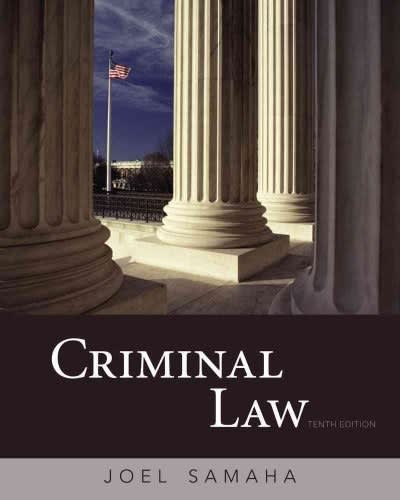Douglas E. Metzger was convicted in the municipal court of the city of Lincoln, Nebraska, of violating
Question:
Douglas E. Metzger was convicted in the municipal court of the city of Lincoln, Nebraska, of violating § 9.52.100 of the Lincoln Municipal Code. The District Court, Lancaster County, affirmed the District Court judgment. Metzger appealed to the Nebraska Supreme Court. The Supreme Court reversed and dismissed the District Court’s judgment. KRIVOSHA, CJ. Metzger lived in a garden-level apartment located in Lincoln, Nebraska. A large window in the apartment faces a parking lot that is situated on the north side of the apartment building. At about 7:45 a.m. on April 30, 1981, another resident of the apartment, while parking his automobile in a space directly in front of Metzger’s apartment window, observed Metzger standing naked with his arms at his sides in his apartment window for a period of five seconds. The resident testified that he saw Metzger’s body from his thighs on up. The resident called the police department and two officers arrived at the apartment at about 8:00 a.m. The officers testified that they observed Metzger standing in front of the window eating a bowl of cereal. They testified that Metzger was standing within a foot of the window, and his nude body, from the mid-thigh on up, was visible. The pertinent portion of ß 9.52.100 of the Lincoln Municipal Code, under which Metzger was charged, provides as follows: “It shall be unlawful for any person within the City of Lincoln . . . to commit any indecent, immodest or filthy act in the presence of any person, or in such a situation that persons passing might ordinarily see the same.
QUESTIONS
1. State the exact wording of the offense Douglas Metzger was convicted of.
2. List all of Metzger’s acts and any other facts relevant to deciding whether he violated the ordinance.
3. State the test the court used to decide whether the ordinance was void-for-vagueness.
4. According to the majority, why was the ordinance vague?
5. According to the dissent, why was the ordinance clear enough to pass the void-for-vagueness test?
6. In your opinion, was the statute clear to a reasonable person? Back up your answer with the facts and arguments in the excerpt and information from the void-for-vagueness discussion in the text
Step by Step Answer:






